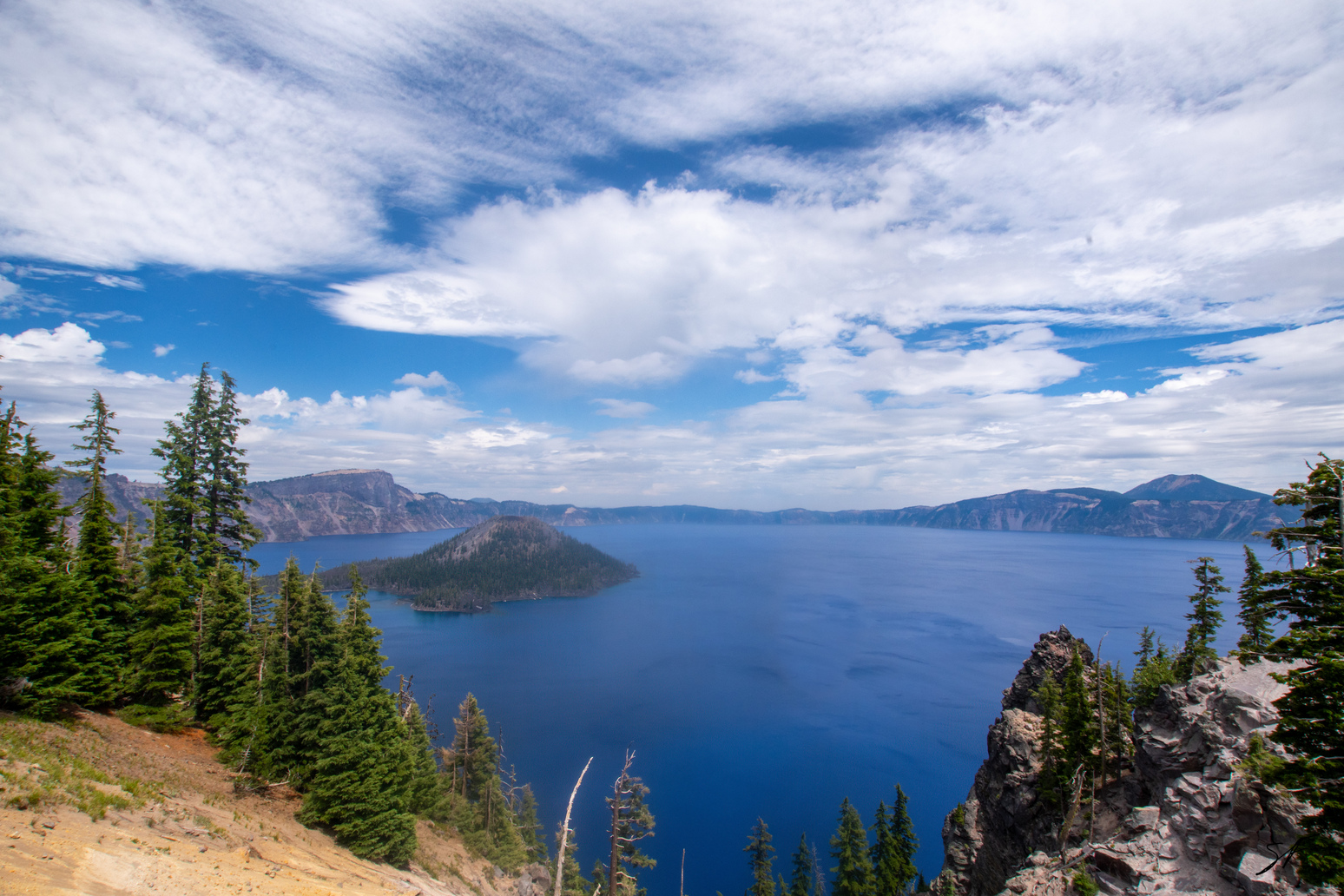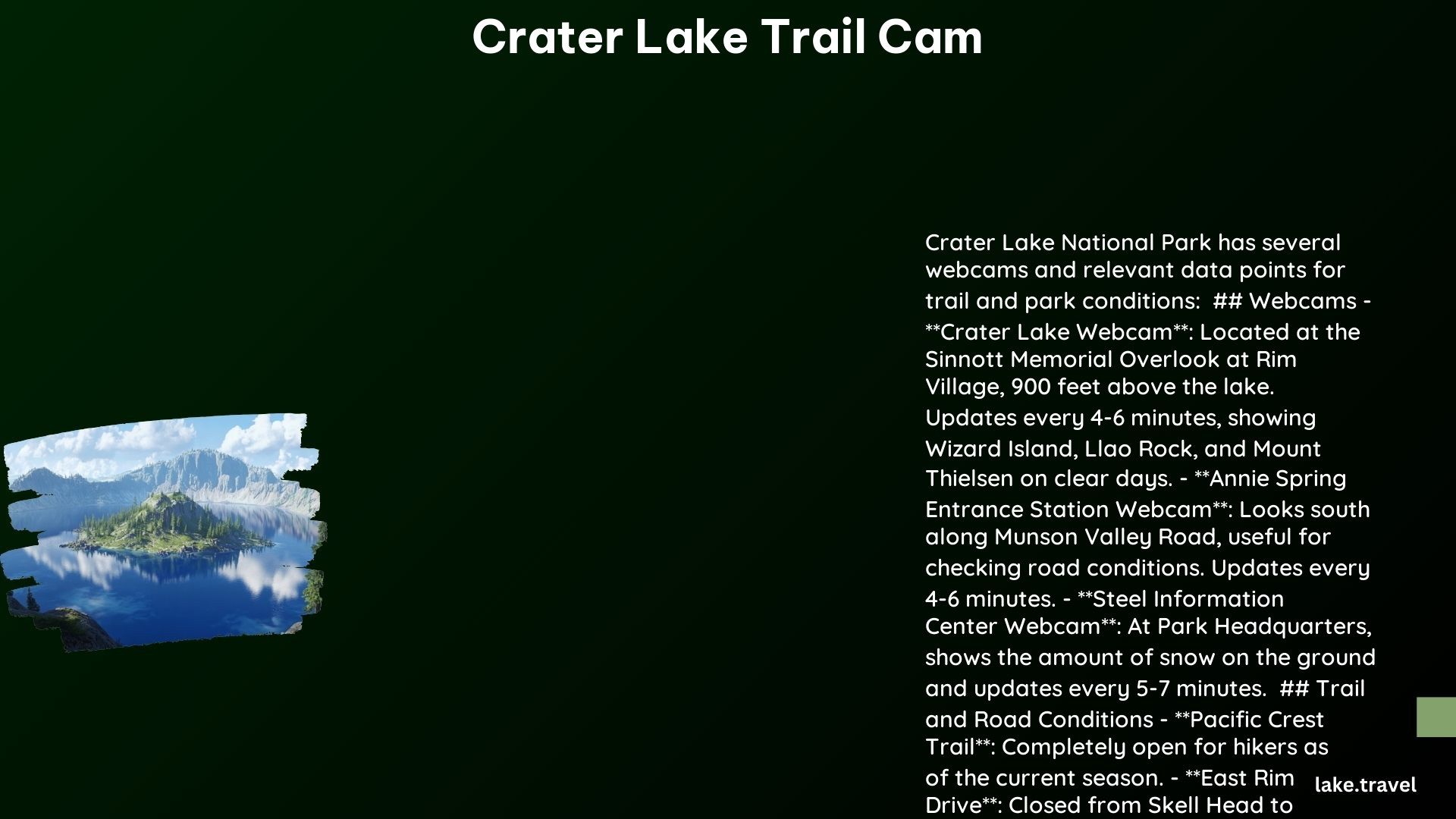Crater Lake trail cams offer a unique glimpse into one of America’s most stunning natural wonders. These webcams provide real-time views of the lake’s pristine waters, surrounding cliffs, and ever-changing weather conditions. Visitors and nature enthusiasts can experience the park’s beauty from afar, plan their trips effectively, and stay updated on current conditions. The trail cams serve as both a virtual tour guide and a practical tool for park management and visitor safety.
What Are the Key Features of Crater Lake Trail Cams?

Crater Lake National Park boasts three primary webcams, each offering distinct perspectives and serving unique purposes:
- Crater Lake Webcam
- Location: Sinnott Memorial Overlook, Rim Village
- Elevation: 7,100 feet
- View: North across the lake, capturing Wizard Island, Llao Rock, and Mount Thielsen
-
Update Frequency: Every 4 to 6 minutes
-
Annie Spring Entrance Station Webcam
- Location: Annie Spring Entrance Station
- View: South along Munson Valley Road
- Purpose: Monitoring road conditions, especially during winter
-
Update Frequency: Every 4 to 6 minutes
-
Steel Information Center Webcam
- Location: Park Headquarters
- Purpose: Assessing snow accumulation and winter conditions
- Update Frequency: Every 5 to 7 minutes
How Do Weather Conditions Affect Trail Cam Visibility?

Weather plays a crucial role in the effectiveness of Crater Lake trail cams:
- Clouds and Fog: Often obscure the lake, especially in winter
- Snow and Ice: Can bury cameras or create obstructions
- Temperature Inversions: May cause fog formation above the lake surface
- Smoke: During wildfire seasons, can significantly reduce visibility
| Weather Condition | Impact on Trail Cams |
|---|---|
| Clouds and Fog | Reduced lake visibility |
| Snow and Ice | Camera obstruction, potential damage |
| Temperature Inversions | Fog formation above lake |
| Smoke | Decreased overall visibility |
What Wildlife Can Be Spotted Through Crater Lake Trail Cams?
While the trail cams are not primarily focused on wildlife, they occasionally capture glimpses of the park’s diverse fauna:
- California gulls floating on the lake
- Potential sightings of deer, eagles, and various bird species
However, detailed wildlife observations are limited due to the cameras’ fixed positions and primary focus on landscape and weather conditions.
How Often Are Crater Lake Trail Cams Updated?
The update frequency of Crater Lake trail cams ensures visitors receive relatively current information:
- Crater Lake Webcam: Every 4 to 6 minutes
- Annie Spring Entrance Station Webcam: Every 4 to 6 minutes
- Steel Information Center Webcam: Every 5 to 7 minutes
This frequent updating allows for near real-time monitoring of weather changes, road conditions, and overall park status.
What Are the Best Times to View Crater Lake Through Trail Cams?
Optimal viewing times for Crater Lake trail cams depend on several factors:
- Season: Summer offers clearer skies and better visibility
- Time of Day: Early morning or late afternoon for best lighting
- Weather Patterns: Clear days after storm systems pass through
Keep in mind that visibility can be reduced by up to 50% during winter months due to cloud cover and precipitation.
How Do Trail Cams Assist in Park Management and Visitor Safety?
Crater Lake trail cams serve multiple purposes beyond providing scenic views:
- Road Condition Monitoring: The Annie Spring Entrance Station cam helps assess road safety
- Snow Accumulation Tracking: The Steel Information Center cam aids in winter operations planning
- Visitor Preparation: Real-time views allow visitors to plan appropriate clothing and activities
- Emergency Response: Cams can help park staff assess situations quickly during emergencies
What Technical Specifications Do Crater Lake Trail Cams Have?
While specific technical details are not publicly available, we can infer some information:
- Resolution: Likely high-definition to capture detailed landscape views
- Weather Resistance: Built to withstand extreme temperatures and precipitation
- Power Source: Possibly solar-powered or connected to park infrastructure
- Connectivity: Utilizes robust internet connections for consistent streaming
How Can Visitors Access Crater Lake Trail Cam Feeds?
Accessing Crater Lake trail cam feeds is straightforward and free:
- Visit the official Crater Lake National Park website
- Navigate to the “Webcams” section
- Choose the desired webcam feed
- No registration or subscription required
What Maintenance Challenges Do Crater Lake Trail Cams Face?
Maintaining trail cams in a harsh mountain environment presents unique challenges:
- Weather Damage: Extreme cold, ice, and wind can affect camera functionality
- Wildlife Interference: Birds or other animals may occasionally obstruct views
- Technical Issues: Remote locations can make repairs and upgrades difficult
- Power Outages: Severe weather can disrupt power supplies to cameras
Park staff must regularly monitor and maintain these systems to ensure consistent operation.
How Do Trail Cams Enhance the Crater Lake Visitor Experience?
Crater Lake trail cams significantly enhance the visitor experience in several ways:
- Pre-Trip Planning: Allows potential visitors to gauge conditions before traveling
- Virtual Visits: Provides access to park views for those unable to visit in person
- Educational Tool: Offers real-time visuals for classroom discussions and research
- Seasonal Tracking: Enables viewers to witness the park’s transformation throughout the year
- Community Engagement: Fosters a connection between the park and a global audience
By providing these services, trail cams help to increase public awareness and appreciation for Crater Lake National Park’s natural beauty and ecological importance.
References:
1. https://www.nps.gov/crla/learn/photosmultimedia/webcams.htm
2. https://www.craterlakeinstitute.com/what-to-do/webcams-at-the-park/
3. https://www.nps.gov/crla/learn/photosmultimedia/lakewebcamgallery.htm
